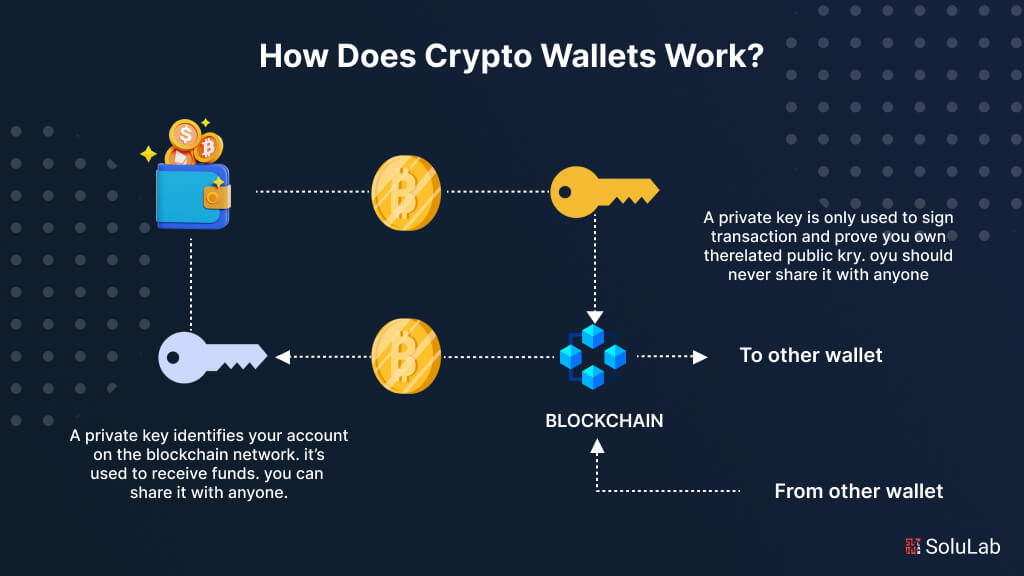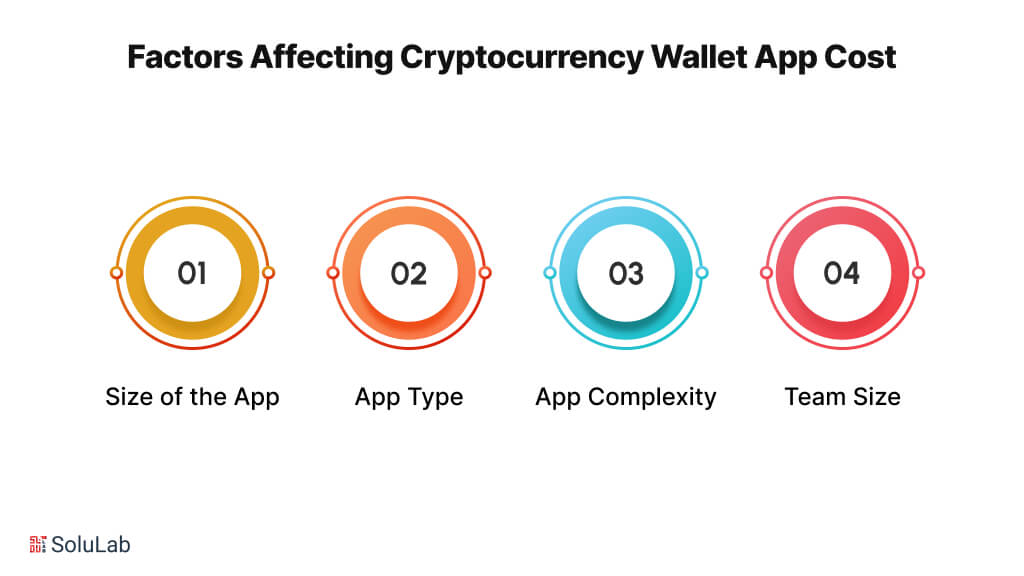
At this stage of technology, cryptocurrency wallets have changed traditional traditional financial transactions and processes, which makes them a disruptive force. The increased demand for digital currencies has led to significant demand for crypto wallets and other digital secure and meaningful means for solutions. Businesses in the Bitcoin sector also enjoy the benefits offered by digital assets to grow using cryptocurrency wallets.
The global community of cryptocurrencies has experienced cryptocurrency wallet app development and growth in the previous few years. Consequently, there has been a notable increase in the requirement for secure and safe storage options. The most recent trends of cryptocurrencies will be discussed in this article, including the meaning of cryptocurrency wallets and its working. They are safe havens that safeguard users’ private keys for controlling and giving them access. Earlier cryptocurrency market size was marked at $6.75 billion and reached up to $8.42 billion in 2023 and is projected to grow to $61.87 billion by 2031 growing at a CAGR of 24.8%.
What Exactly are Cryptocurrency Wallets?
Cryptocurrency wallets are made to keep your private keys safe so that you can always easily access your funds. They allow you to transmit, acquire, and make use of your cryptocurrencies in a way you can with Bitcoin and Ethereum. You can transmit and receive cryptocurrencies at the same time protect and keep your private keys secure.
Along with private keys, you also get a password that grants you access to cryptocurrency holdings. Since cryptocurrency lacks a physical token such as coins, cash, and bills it still is a very abstract value to store. On a bigger blockchain, it is nothing further than a single piece of code.
What is it that you possess when you buy a Bitcoin? A public key and a private key, but if you lose your private key you can lose your grant to access cryptocurrency. Likewise, the complete privilege of the crypto is granted to the owner of a private key. The most essential feature of cryptocurrency wallets is to keep your private keys safe.
How does Cryptocurrency Wallets Work?

Applications for PCs and mobile devices such as tablets, phones, etc are known as cryptocurrency wallets. To connect to the blockchain system for the cryptocurrency you are using an internet connection. Cryptocurrencies are fragments of data scattered over a database; they are not stored anyplace, the wallets locate all the pieces linked to your public address and compute within the app’s user interface for you.
Coins that are held by users are not technically stored in a crypto wallet. Rather it is the secret to their money, which is kept on open blockchain systems. A user must utilize a private key provided with a collection of unique numbers to validate their wallet address before they can carry out any kind of transaction. The type of wallet a user possesses can have an impact on both speed and security. In general, crypto wallets give a user the ability to start, sign, and then publish the transaction to the network. Here is a simple step-by-step breakdown of how crypto wallets work in practice:
- Through the wallet interface, a transaction is initialized
- The interface shows you the facts of any possible transaction or the “intent” of a digital proposition.
- Click Confirm, on the wallet interface
- Your private key is used by the wallet to sign the transaction
- Once the transaction is signed, it is later transmitted to the network but only possible with an internet connection.
Top 4 Types of Cryptocurrency Wallets
The top wallets for cryptocurrency are categorized into two categories, hot wallets which are based on the internet, and cold wallets which can work offline and come in the form of physical devices. Here are the types of best cryptocurrency wallets:
1. Smartphone Wallets
Mobile wallets are a type of hot wallet, which helps users to send and receive cryptocurrency anywhere they have access to a phone number and the internet connection, smoothly, and securely. With the benefits, mobile wallets do hold drawbacks which include of course losing your device and fraud, malware, and hacking.
2. Web Wallets
Web wallets save your private keys on a server that is run by a third party, like a cryptocurrency exchange that is consistently online. Web wallets can be particularly convenient because they allow users to gain their funds from anywhere as long as they have an internet connection. Due to this third-party involvement, it can make your ID and passwords prone to hacking.
3. Paper Wallets
A paper wallet is a type of cold wallet. As the name suggests, paper wallets are an offline wallet solution in which private keys are printed, written down, and kept safe as it becomes unable to hack them. No third party can hand over your private keys, as well as QR codes make it easier to access. Apart from all these benefits, paper wallets take more time and work.
4. Hardware Wallets
Hardware wallets are yet another popular kind of cold wallet. These wallets are beneficial for people who prefer a more high-tech solution providing a more secure placement for private keys. This is also known as the safest way to store cryptocurrency, these private keys are used to sign transactions offline and they can only be uploaded online to the blockchain and are easily accessible at electronics stores.

Rise of Non-Custodial Wallets
Non-custodial wallets are an excellent option for cryptocurrency pursuits who wish to break free from the control of centralized entities since they provide unmatched individual control. If for any reason one component of any entity fails, it will not have any impact on non-custodial wallets, as they are not vulnerable to a single point of failure. In addition, money in a self-custodial wallet cannot be frozen or taken by a centralized organization.
Anyone with an internet connection, and anyone in the world can easily set up a wallet without any KYC restrictions, this promotes accessibility and inclusivity, hence, making the smooth movement of bitcoin funds possible. They provide you with exclusive access to the growing decentralized finance Defi ecosystem thanks to direct engagement, which is an advantage not provided in custodial wallets.
Read Also: Hot vs Cold Crypto Wallets
Impact of Cryptocurrency Wallet Development Services
Since the acceptance of cryptocurrencies is still in its early stages, crypto wallet development services have gained more significance in recent years. More people are investing in cryptocurrencies, which in return has increased the demand for cryptocurrency wallets. Here are some of the major impacts of cryptocurrency wallet development and a reason why you should be interested in it:
1. For starters, it provides customers with a useful and very secure method to manage their digital portfolio. It is getting harder for individuals to maintain their investments among several platforms as the cryptocurrencies rise.
2. Secondly, the security offered by cryptocurrency wallets is superior to other traditional banking systems. Traditional system holders are prone to the danger of being victims of security lapses, fraud, and hacking. Also, crypto users access full control over their digital assets and can make use of multiple-factor authentication.
3. Another major impact is the power of completely transforming the financial sector. Crypto wallets allow its users to access and manage these digital assets. Cryptocurrencies present a decentralized alternative for establishing financial institutions. The more companies use cryptocurrencies, the more development it will offer to the crypto wallets.
4. Lastly, business owners, developers, and investors can find business potential in developing cryptocurrency wallets. Creating cryptocurrency wallets can also benefit businesses since it allows them to broaden their product offerings and penetrate new markets.
Read Also: How to Create a Wallet like Phantom?
Why is Artificial Intelligence Required for Wallet Development?
The development of Bitcoin wallets has significantly advanced with the incorporation of artificial intelligence. Users can step into a safer future for transactions, efficient workflow, and personalized experiences with AI-powered solutions. These digital wallets are constantly developing thanks to AI. Here is the breakdown of roles played by AI for wallet development:
1. Wise Transaction Monitoring
Cryptocurrency wallet development solutions with AI abilities can track payments in real time and offer relevant data. By making use of transactional data and proper analysis of recent market trends, these wallets can provide personalized recommendations, minimize transaction costs, and forecast future market movements. It gives people the potential to wisely decide and make the most out of their cryptocurrencies.
2. Fraud Detection and Risk Management
AI systems are quite good at managing risks and looking out for potential fraud and threats in cryptocurrency wallets. Artificial intelligence is capable of analyzing market situations, behavioral trends, and historical data. Assisting in identifying possible weak points of fraudulent activity is another important role played by AI this helps in shielding users from monetary loss. To ensure safe transactions, AI-powered systems might check counterparties’ legitimacy and reputation.
3. Multi-Factor Verification
In many situations, biometrics can also be faked, this is where multi-factor verification comes in and turns out to be very useful. Robust MFA systems require a special code that will be sent to your phone or email in addition to password and fingerprint verification and can be powered by AI. Once this extra step of precaution is done, it can lower the possibility of unwanted access and guarantee that only legitimate users can use it for cryptocurrency holdings.
4. Simplifying User Experience
Capabilities of facial and voice recognition, biometrics of behavior, and natural language processing within artificial intelligence make the identification process simpler and user-friendly. Biometric identifiers allow users to safely access their wallets, doing away the need for complex passwords and increasing ease.
What are the Factors Affecting Cryptocurrency Wallet App Cost?

The basic price of developing a cryptocurrency wallet app based on blockchain starts from $15,000, for a wallet with additional sophisticated features it might cost you $200,000. However, the criteria of the costs of a wallet depend upon the following factors:
1. Size of the App: Generally there are three sizes that businesses are offered when it comes to designing a cryptocurrency wallet. The small size nearly costs $15,000-$30,00 as it only compromises 10 to 30 experts. Whereas the mid-scale wallets would cost you around $30,000-$70,000 because they are a good team of 50+ employees. Lastly, the large-scale wallets would cost you a good $60,000-$150,000 as it is a huge team of 500+ employees working together.
2. App Type: The finest decentralized cryptocurrency wallet is essential for any crypto business to be operational. Before starting the process of building the wallet, the business needs to choose the type of software. These software are divided into two categories one is cryptocurrency-based solutions such as ICOs, wallets, and Dapps, while another is non-cryptocurrency-based solutions such as logistics and banking.
3. App Complexity: You need to make sure your blockchain app is explicit about the issues customers are facing, and the solutions you can provide along with the resources it might require. This will assist you in locating the best cryptocurrency wallet development solutions. These are some of the major variables that affect the complexity of an app:
- Platform
- Information Technology
- Integration of APIs
- UI/UX Design
4. Team Size: The number of team members working on your project is something you should always take into account while planning the construction of a Bitcoin wallet. If you require more workers, the cost is more likely to increase. That is why it becomes important to hire internal specialists, make use of independent contractors, and use a knowledgeable cryptocurrency wallet. Your choice will affect the price.
Read Also: Why Every Business Should Integrate POS Crypto Wallets?
Best Crypto Wallets and Trends of 2025
Even though crypto wallet development solutions perform differently than stuffing cash into billfold, they offer a secure location to keep the cryptocurrency safe and secure. For this, the first step becomes determining several possibilities that fit best for you and your requirements. Here is a breakdown of the best crypto wallets in 2025 be they hot or cold that will help you make a more informed decision:
A. Hot Wallets
- Coinbase Wallet Web3
- MetaMask
- Exodus Wallet
B. Cold Wallets
- Ledger Crypto Wallet
- Elliptical Wallet
- Safe Pal Crypto Wallet
Major Benefits of Cryptocurrency Wallets
India is trading cryptocurrencies regularly, which is why the expected growth rate (CAGR) is expected to reach 54.11% from 2024 to 2032. This growth is not alone driven by growing recognition but many other factors like investment choice, the development of the Indian economy, and government initiatives also play a role in this along with the rise of cryptocurrency wallets. Apart from top wallets and the rise of cryptocurrency here are some major trends taking place in 2025:
-
Improved Security Features
Developers are giving top priority to advanced safety measures in 2025 so that they can safeguard the digital assets of users from potential attacks online. Utilization of physical verification procedures such as fingerprints and face recognition along with multi-signature wallets authentication which requires several authorizations before transitioning.
-
Decentralized Payment Systems
The shift towards decentralization has become quite significant in 2025. Decentralized wallets are becoming popular due to their ability to provide users with complete control over their money and private keys. This development is in line with the larger push for greater autonomy and transparency in financial operations as well as the movements towards Decentralized Finance (DeFi).
-
Development of Mobile Wallets
The year 2025 has seen and continues to see a major trend in the development of mobile wallets due to the ever-growing popularity of smartphones. Blockchain mobile wallets allow users to conveniently manage their digital assets while on the go. Wallets are being optimized by developers for mobile devices, making sure they are responsive, lightweight, and rich in features.
-
Integration of Traditional Systems
Another development in 2025 to the eye is the merging of conventional financial services with blockchain technology. To facilitate the integration between blockchain technology and conventional financial systems, users can link their wallets to credit cards, bank accounts, and other financial services.
-
Reciprocal Cooperartion
In 2025, cross-chain compatible blockchain wallets have come out as an advancement of wallets, that allow users to manage various cryptocurrencies from various blockchains under one wallet. This feature also encourages higher acceptance and utilization of digital assets with a streamlined user experience and offers smooth transactions across every top blockchain platform.
Why You Should Choose SoluLab as Your Wallet Development Company?
Cryptocurrency wallets have now become necessary tools for people and companies that wish to store, manage, and transact digital assets securely and quickly in the transforming digital ecosystem today. What are you waiting for them? Partnering up with SoluLab a blockchain development company can help you fully utilize the potential of cryptocurrencies through cryptocurrency wallet app development.
With our proficiency in AI-driven solutions, customized development, and steadfast dedication to security, we can be your best choice when it comes to assisting you in creating a reliable and user-friendly wallet application that will satisfy your tailored requirements.
Contact us today to discuss how you can be a part of the cryptocurrency development journey and make good use of it!
FAQs
1. What are Cryptocurrency Wallets?
A digital platform that allows safe and secure storage, sharing, receiving, and maintenance of digital assets. This in a way provides a gateway to the bitcoin realm which in return enhances the transactions seamlessly.
2. Why Do I Need a Crypto Wallet?
If you are willing to invest and become a part of popular bitcoins and cryptocurrencies you are going to need a crypto wallet. It allows for safe administration and provides a user-friendly interface making it convenient to assess your assets digitally.
3. Which is Considered the best wallet for cryptocurrency in India?
A hot wallet, Exodus is being considered the best type of cryptocurrency wallet in India as of recent demand and trends as it provides users with a stacking option which makes it easier to earn a passive income.
4. If I Want A Secure Wallet Out of All Which One Should I Go For?
Ledger Live, a cold non-custodial wallet is considered the safest of all because of the secure hardware wallet design, offline storage of private keys, and regular security audits promising protection for your digital assets.
5. Does Cryptocurrency Wallets Only Store Bitcoins?
No, cryptocurrency wallets can also store multiple cryptocurrencies apart from bitcoin. Some of the wallets let you store various digital assets, like Litecoin, Ethereum, and other popular tokens.





